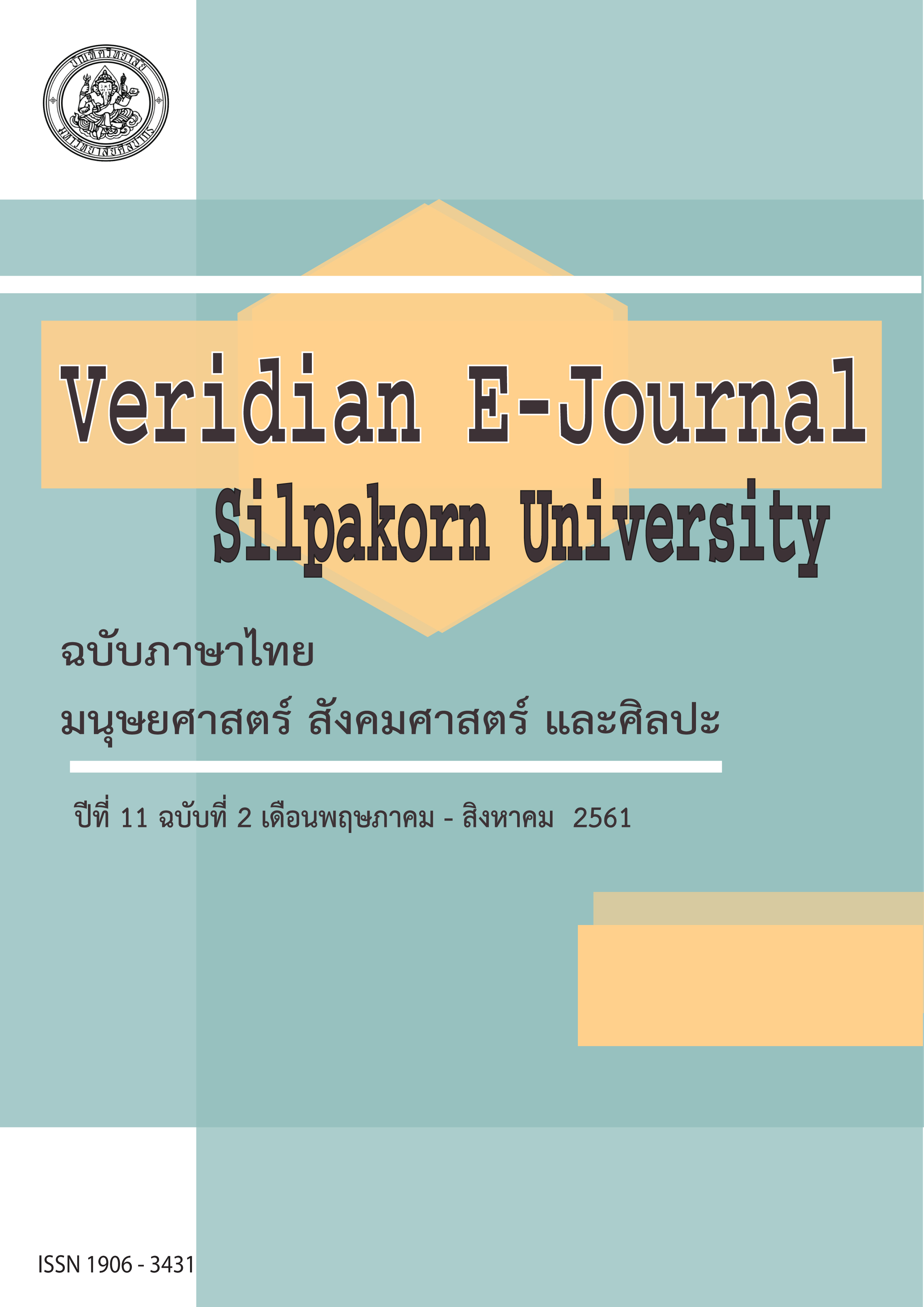การพัฒนากิจกรรมการเรียนการสอนรายวิชาจิตวิทยาอุตสาหกรรมบริการจากข้อสะท้อนของผู้เรียน:กรณีศึกษา โครงการจัดตั้งภาควิชาอุตสาหกรรมบริการและนวัตกรรมภาษา (The Development of the Instructional Activities in Service Industry Psychology subject based on the feedback of the student: a Case study of Department of Service Industry and Language Innovation)
Main Article Content
Abstract
การวิจัยเชิงปฏิบัติการนี้มีวัตถุประสงค์เพื่อ 1) พัฒนากิจกรรมการเรียนการสอนรายวิชาจิตวิทยาอุตสาหกรรมบริการจากข้อสะท้อนของผู้เรียน 2) ศึกษาผลการจัดกิจกรรมการเรียนการสอนรายวิชาจิตวิทยาอุตสาหกรรมบริการจากข้อสะท้อนของผู้เรียน และ 3) สะท้อนผลกระบวนการและการพัฒนากิจกรรมการเรียนการสอนรายวิชาจิตวิทยาอุตสาหกรรมบริการจากข้อสะท้อนของผู้เรียน การดำเนินการมี 3 ขั้นตอน ประกอบด้วย ขั้นตอนที่ 1 การพัฒนากิจกรรมการเรียนการสอนจากข้อสะท้อนของนิสิต ประกอบด้วยผู้มีส่วนเกี่ยวข้อง 2 ฝ่าย คือ ฝ่ายที่ 1 อาจารย์ผู้สอนวิชาจิตวิทยาอุตสาหกรรมบริการ หมู่เรียน 857 และ หมู่เรียน 860 1 คน และฝ่ายที่ 2 นิสิตที่เรียน หมู่เรียน 857 และหมู่เรียน 860 141 คน รวมทั้งสิ้น 142 คน ขั้นตอนที่ 2 การปฏิบัติการและสังเกตผลการพัฒนากิจกรรมการเรียนการสอนจากข้อสะท้อนของผู้เรียน ประกอบด้วยผู้มีส่วนเกี่ยวข้อง 2 ฝ่าย คือ ฝ่ายที่ 1 อาจารย์ผู้สอนรายวิชาจิตวิทยาอุตสาหกรรมบริการ หมู่เรียน 857 และ หมู่เรียน 860 1 คน และฝ่ายที่ 2 นิสิตที่เรียน หมู่เรียน 857 และหมู่เรียน 860 141 คน รวมทั้งสิ้น 142 คน และ ขั้นตอนที่ 3 ขั้นสะท้อนผลกระบวนการและการพัฒนากิจกรรมการเรียนการสอนจากข้อสะท้อนของผู้เรียน ประกอบด้วยผู้มีส่วนเกี่ยวข้อง 2 ฝ่าย คือ ฝ่ายที่ 1 อาจารย์ผู้สอนรายวิชาจิตวิทยาอุตสาหกรรมบริการ หมู่เรียน 857 และ หมู่เรียน 860 1 คน และฝ่ายที่ 2 นิสิตที่เรียน หมู่เรียน 857 และหมู่เรียน 860 141 คน รวมทั้งสิ้น 142 คน การเก็บข้อมูล 1) เก็บข้อมูลเชิงปริมาณแล้วนำมาวิเคราะห์ประมวลผลข้อมูลด้วยสถิติพื้นฐาน และ 2) เก็บข้อมูลเชิงคุณภาพแล้วประมวลผลข้อมูลเชิงคุณภาพโดยการวิเคราะห์เนื้อหา
ผลการวิจัยพบว่า 1) กิจกรรมการเรียนการสอนรายวิชาจิตวิทยาอุตสาหกรรมบริการที่พัฒนาขึ้นชื่อว่า “กิจกรรมจิตวิทยาอุตสาหกรรมบริการ” มีเนื้อหาประกอบด้วย 1.1) บุคลิกภาพ มนุษยสัมพันธ์ การสร้างและการพัฒนาเพื่อการบริการ 1.2) เจตคติในการบริการ 1.3) การจูงใจเพื่อการบริการ 1.4) ความพึงพอใจในการบริการ และ 1.5) ภาวะผู้นำและการทำงานเป็นทีม 2) ผลการจัดกิจกรรมการเรียนการสอนจากข้อสะท้อนของผู้เรียน 2.1) ด้านความรู้ ผู้เรียนได้สอบได้คะแนนเฉลี่ยหลังเรียนร้อยละ 58.07 จากคะแนน 30 คะแนน 2.2) ด้านทักษะ ผู้เรียนมีทักษะการปฏิบัติงานกลุ่มในระดับดีมาก และ 2.3) ด้านความพึงพอใจของผู้เรียนหลังเรียนอยู่ในระดับดีมาก และ 3) ผลสะท้อนของกระบวนการและการพัฒนากิจกรรมการเรียนการสอนวิชาจิตวิทยาอุตสาหกรรมบริการจากผู้เรียน พบว่า 3.1) กระบวนการจัดการเรียนการสอนจากข้อสะท้อนของผู้เรียนนั้นเป็นแนวทางการจัดการเรียนสอนที่ดีเพราะทำให้ผู้เรียนได้มีส่วนร่วมในการจัดการเรียนการสอน 3.2) แผนการจัดกิจกรรมการเรียนการสอนรายวิชาจิตวิทยาอุตสาหกรรมบริการมีกิจกรรมที่หลากหลายทำให้ผู้เรียนสนใจเรียนจึงทำให้ให้ผลการเรียนของผู้เรียนออกมานทิศทางที่ดี
This action research aimed to 1) enhance the instructional activities in service industry psychology subject based on the feedback of student; 2) investigate the effects of applying instructional activities in service industry psychology subject based on the feedback of student; and 3) reflect the effect of process and applying instructional activities in service industry psychology subject based on the feedback of student. There were 3 phases research methods; 1) planning of the development of the instructional activities in service industry psychology subject based on the feedback of student, i.e., 2 groups of 142 participants (lecturer participant was 1 lecturer. The student’s participants were 141 student’s summation of student in 857 group and student in 860 group); 2) action and observing the effects of using instructional activities in service industry psychology subject based on the feedback of students; i.e., there are 2 groups of 142 participants (lecturer participant was 1 lecturer. The student’s participants were 141 student’s summation of student in 857 group and student in 860 group) and 3) reflecting the effects of process and development of instructional activities in service industry psychology subject based on the feedback of students, i.e., 2 groups of 142 participants (lecturer participant was 1 lecturer. The student’s participants were 141 student’s summation of student in 857 group and student in 860 group) Quantitative and qualitative data collections were applied into this investigation. Basic statistics was used for quantitative data analysis, white the content analysis was applied for the quantitative data.
The findings revealed that: 1) instructional activities in service industry psychology subject based calling “Psychology activities” was arisen from the development of the instructional activities in service industry psychology subject based on the feedback of the students, and contents were 1.1) service personality and human relation: create and development for service, 1.2) attitude in service, 1.3) Motivation for service 1.4) service satisfaction and 1.5) leadership and team work; 2) there were 3 achievement of effects of using instructional activities in service industry psychology subject based on the feedback of student, i.e., 2.1) knowledge bases, after using instructional activities in service industry psychology subject based on the feedback of student, the means scores of students were 58.07 percent; 2.2) group skills base, the means scores of the student were very good level; and 2.3) students’ satisfactory after participating the instructional activities in service industry psychology subject based on the feedback of student was in the most level; and 3) reflecting the effect of processes and development of Instructional activities in service industry psychology subject based on the feedback of student were 3.1) the process of instructional activities in service industry psychology subject based on the feedback of students was good approach because students could be participated instructional management; 3.2) because diversity of activities in learning plan of service industry psychology subject based makes students’ achievements of effects were good as the result of students were interested in learning.

